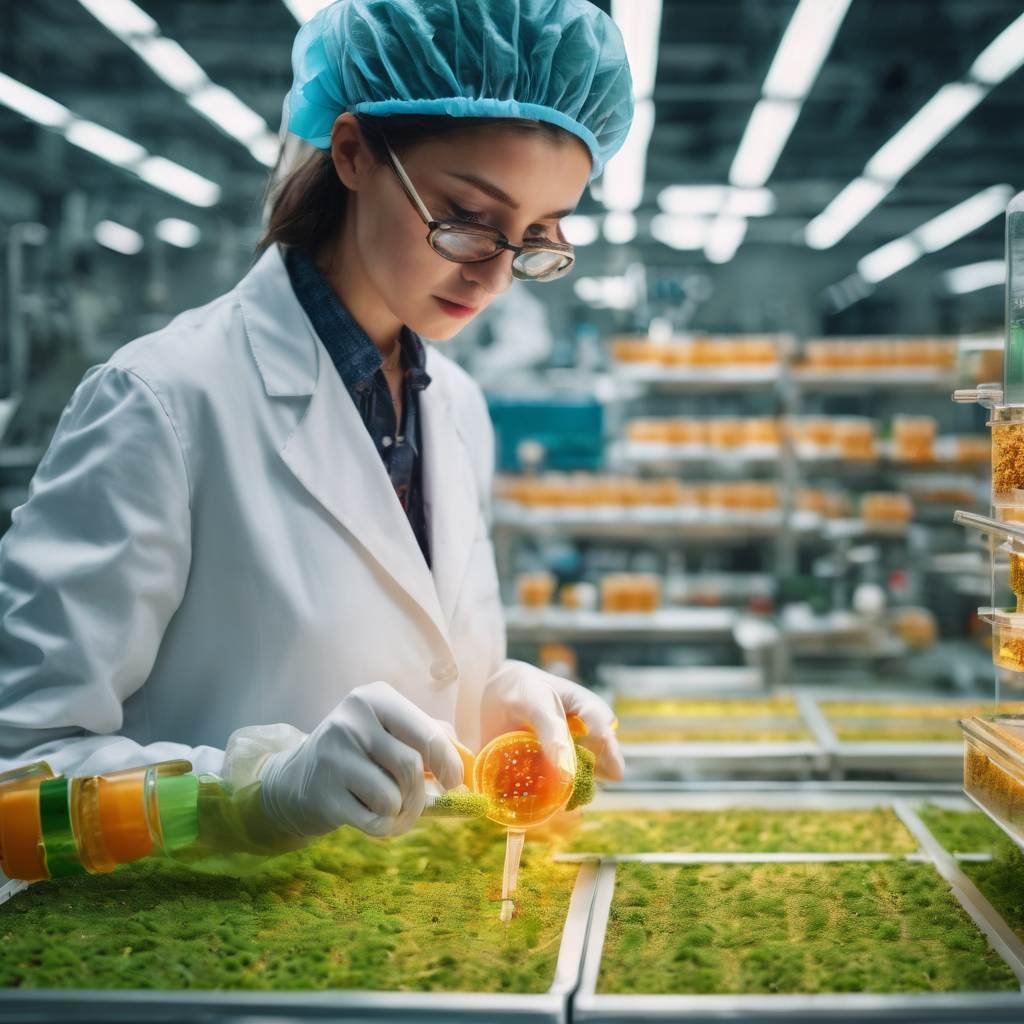Introduction On Biotechnology Advancements
Welcome to ChangeofTech.com, where we embark on a fascinating exploration of “Biotechnology Advancements.” In this blog post, we delve into the cutting-edge innovations and breakthroughs that are reshaping the landscape of biotechnology, unlocking new possibilities for the future.
Table of Contents
The Renaissance of Biotechnology
Welcome to ChangeofTech.com, where we embark on a fascinating exploration of “Biotechnology Advancements.” In this blog post, we delve into the cutting-edge innovations and breakthroughs that are reshaping the landscape of biotechnology, unlocking new possibilities for the future.

Genomics Revolution On Biotechnology Advancements

Decoding the Blueprint of Life Embark on a journey into the genomics revolution, where advancements in DNA sequencing and analysis have ushered in a new era of precision medicine and personalized healthcare. Explore how genomics is reshaping our understanding of genetics and its implications for disease diagnosis and treatment.
Genomics, the study of an organism’s entire DNA sequence, has witnessed remarkable advancements. Next-generation sequencing technologies have made it possible to decode entire genomes quickly and cost-effectively, paving the way for personalized medicine tailored to individual genetic profiles.
CRISPR-Cas9 On Biotechnology Advancements
The Precision Tool of Gene Editing Enter the realm of CRISPR-Cas9, a revolutionary gene-editing tool that has garnered widespread attention for its precision and versatility. Explore how CRISPR technology is transforming genetic research, therapeutic applications, and the potential for addressing genetic disorders.
CRISPR-Cas9 allows scientists to precisely edit genes by targeting specific DNA sequences. This technology has opened new avenues for genetic research, including the development of potential gene therapies and the study of gene function.

Synthetic Biology On Biotechnology Advancements

Designing Life at the Molecular Level Dive into the realm of synthetic biology, where scientists engineer biological systems for novel functions or applications. Explore how this interdisciplinary field is enabling the design and construction of new biological entities with potential implications for medicine, energy, and beyond.
Synthetic biology combines principles from biology, engineering, and computer science to design and construct biological components or systems. From engineered microbes for drug production to the creation of synthetic organisms, synthetic biology is pushing the boundaries of what’s achievable in biotechnology.
Biotechnology in Medicine
From Therapeutics to Vaccines Explore the significant impact of biotechnology in the field of medicine. From the development of biopharmaceuticals to the rapid advancements in vaccine technology, discover how biotechnology is revolutionizing healthcare and shaping the future of medicine.
Biotechnology has played a pivotal role in the production of therapeutic proteins, monoclonal antibodies, and vaccines. The use of biotechnological tools has accelerated drug development, enhanced treatment efficacy, and contributed to the rapid response to emerging infectious diseases.

Environmental Applications On Biotechnology Advancements

Biotechnology’s Role in Conservation Discover how biotechnology is making significant contributions to environmental conservation. Explore applications such as environmental monitoring, restoration ecology, and the use of biotechnological tools to address challenges like pollution and habitat degradation.
Biotechnology offers innovative solutions for environmental challenges, from utilizing DNA-based technologies for monitoring biodiversity to employing genetically engineered organisms for environmental cleanup. These applications showcase the potential of biotechnology in preserving ecosystems and biodiversity.
Agricultural Biotechnology On Biotechnology Advancements
Enhancing Crop Productivity and Sustainability Explore the role of biotechnology in agriculture, where genetic engineering and advanced breeding techniques contribute to crop improvement, pest resistance, and sustainable farming practices. Uncover the potential of biotechnological innovations to address food security challenges.
Biotechnology in agriculture has led to the development of genetically modified crops with enhanced traits, such as resistance to pests and diseases. Additionally, precision breeding techniques contribute to the creation of crops that are more resilient and adaptable to changing environmental conditions.

Ethical Considerations in Biotechnology

Navigating the Moral Landscape Delve into the ethical considerations surrounding biotechnological advancements. Explore the implications of gene editing, synthetic biology, and other biotechnological applications on human rights, societal values, and the responsible use of emerging technologies.
As biotechnological capabilities expand, ethical considerations become increasingly important. Discussions surrounding the moral implications of manipulating genetic information and creating synthetic life raise questions about the responsible use of these powerful technologies.
The Future Landscape of Biotechnology
Trends and Predictions Peer into the crystal ball and explore the future trends and predictions shaping the landscape of biotechnology. From advancements in artificial intelligence integration to emerging frontiers in regenerative medicine, discover the exciting possibilities on the horizon.
The future of biotechnology holds promise for even more transformative breakthroughs. Trends include the integration of artificial intelligence for data analysis, personalized regenerative therapies, and the continued convergence of biotechnology with other scientific disciplines.

FAQs On Biotechnology Advancements

Q1: How does genomics contribute to personalized medicine?
A1: Genomics provides insights into an individual’s genetic makeup, enabling healthcare professionals to customize treatment plans based on genetic factors. This precision medicine approach improves the effectiveness of treatments while minimizing side effects.
Q2: What are the key challenges in the genomics field?
A2: Challenges in genomics include ethical considerations, data privacy concerns, and the interpretation of complex genetic information. Addressing these challenges is crucial for maximizing the benefits of genomics in healthcare.
Q3: How does CRISPR-Cas9 work in gene editing?
A3: CRISPR-Cas9 works by using a guide RNA to target a specific DNA sequence. The Cas9 enzyme then acts as molecular scissors, cutting the DNA at the targeted location. Researchers can introduce desired changes or modifications during the repair process.
Q4: What are the ethical considerations surrounding CRISPR technology?
A4: Ethical considerations include concerns about unintended consequences, the potential for misuse, and the implications of germline editing (editing genes that can be passed on to future generations). Ongoing discussions and guidelines aim to address these ethical challenges responsibly.
Q5: What are some applications of synthetic biology?
A5: Applications include the development of biofuels, bioremediation, and the creation of genetically modified organisms for industrial or medical purposes. Synthetic biology also holds promise for designing custom organisms with specific functions.
Q6: What are the challenges in the field of synthetic biology?
A6: Challenges include the potential environmental impact of synthetic organisms, ethical considerations, and the need for comprehensive safety measures. Addressing these challenges is essential for the responsible advancement of synthetic biology.
Q7: How has biotechnology transformed drug development?
A7: Biotechnology has streamlined drug development by enabling the production of complex therapeutic proteins and antibodies. Techniques like recombinant DNA technology and cell culture systems have revolutionized the pharmaceutical industry.
Q8: What role does biotechnology play in vaccine development?
A8: Biotechnology is crucial in vaccine development, from identifying antigens to production using recombinant DNA technology. The speed at which biotechnological tools can be applied has been instrumental in responding to emerging infectious diseases.
Q9: How can biotechnology contribute to environmental monitoring?
A9: Biotechnology aids environmental monitoring by providing tools for DNA-based identification of species, assessing water quality, and detecting pollutants. These technologies offer more accurate and efficient methods for monitoring changes in ecosystems.
Q10: What are some examples of biotechnological applications in environmental cleanup?
A10: Examples include the use of genetically modified microorganisms to break down pollutants, phytoremediation using plants to absorb contaminants, and DNA-based tools for tracking and understanding environmental changes.
Q11: How does biotechnology contribute to pest resistance in crops?
A11: Biotechnology enables the introduction of genes that confer resistance to pests, reducing the need for chemical pesticides. This approach enhances crop protection while minimizing the environmental impact associated with traditional pest control methods.
Q12: Can biotechnology address challenges in global food security?
A12: Yes, biotechnology plays a crucial role in addressing food security challenges by improving crop yield, nutritional content, and resistance to environmental stressors. These advancements contribute to ensuring a more reliable and sustainable global food supply.
Q13: What ethical challenges are associated with gene editing technologies like CRISPR-Cas9?
A13: Ethical challenges include concerns about unintended consequences, the potential for genetic enhancements, and the impact on future generations. Ethical frameworks and guidelines are essential for ensuring responsible and equitable use of gene editing technologies.
Q14: How can society navigate the ethical considerations in synthetic biology?
A14: Navigating the ethical considerations in synthetic biology requires ongoing dialogue, transparency, and the involvement of diverse stakeholders. Ethical frameworks and regulatory measures are essential to guide the development and application of synthetic biology responsibly.
Q15: How might artificial intelligence enhance biotechnological research?
A15: Artificial intelligence can accelerate biotechnological research by analyzing vast datasets, predicting biological outcomes, and optimizing experimental designs. This integration enhances the efficiency and effectiveness of biotechnological advancements.
Q16: What are the potential applications of regenerative medicine in biotechnology?
A16: Regenerative medicine applications include tissue engineering, organ transplantation, and the development of therapies for degenerative diseases. The field holds promise for creating personalized treatments that harness the body’s regenerative capabilities.
Conclusion On Biotechnology Advancements
In conclusion, “Biotechnology Advancements” encapsulates the remarkable journey of biotechnology from its roots to the forefront of scientific innovation. Genomics, CRISPR-Cas9, synthetic biology, and the impact on medicine represent just a fraction of the vast possibilities that biotechnology holds for the future.
As we navigate this era of biotechnological advancements, ChangeofTech.com remains dedicated to unraveling the complexities and showcasing the potential of biotechnology in shaping a brighter, healthier future for humanity. Join us on this thrilling exploration into the world of biotechnology, where the fusion of science and innovation continues to unlock unprecedented opportunities for progress and discovery.

Pingback: Edge Computing Transformation - changeoftech.com